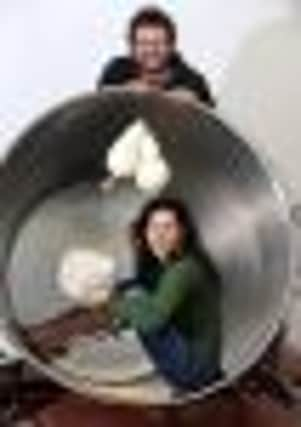Duo left cheesed off after losing licence appeal


Gabriele Caputo and Adriana Alonzi applied for approval for their business in September 2010, and were granted a conditional approval for three months in November 2010, and then for a further three months.
Conditional approval can only be given for a total of six months and then full approval must be given or refused. But, after an inspection in June of this year, the application was refused by the city council’s environmental health department over cleanliness issues.
Advertisement
Hide AdAdvertisement
Hide AdSenior environmental health officer Heather Gray reported that the premises were not clean, being affected by concrete dust and mould. In addition, the seals of the wall on the fridge door were mouldy, the bottom of the wall of the fridge at the door was rusty, there was no means for the staff to dry their hands hygienically, the tiles on the floor were cracked and certain wall surfaces were not easy to clean.
At the appeal hearing at Edinburgh Sheriff Court, Mr Caputo accepted there was dust on the premises, a mouldy seal and rust on the fridge door, but said these defects were outside the production room and there was no contamination of any part of the cheesemaking process.
The lavatory area was not in use and a window sill in the production room which was said to have dust on it was 15 metres away from the vat in which the cheese was made.
In his judgment, Sheriff Nigel Morrison QC, said: “It does not matter in my opinion that the lavatory and washing facilities were not used, they were available for use. It was the only washing facility.
“It did not matter whether there was, or could in fact be, no contamination from the concrete dust and dirt inside or outside the production room. It does not matter that the dust on the window sill was 15 metres from the vat. The point was that there was the risk of contamination and that is why the premises had to be kept clean.”
Mr Caputo expressed concern that in East Lothian he had had no difficulty producing cheese, but claimed Edinburgh “was being difficult”.
Mrs Gray explained that in East Lothian, Mr Caputo had been making cheese from pasteurised milk whereas in Edinburgh he was making cheese with raw milk. Mr Caputo said the law did not require different rules for raw and pasteurised milk and claimed the department did not understand the process of cheesemaking.
Sheriff Morrison said Mr Caputo was proud of the fact he had a quality product, about which he had never received a complaint from a customer. He and Miss Alonzi felt “hard done by”. They had tried to comply with all that was expected of them.
Advertisement
Hide AdAdvertisement
Hide AdHe added: “I fully understand that Mr Caputo and Miss Alonzi are trying to run a small and successful business of selling quality Italian cheeses and feel thwarted in their efforts. It is not possible, however, for me to do otherwise than decide the case on the basis of whether the decision was incorrect. Factually, for instance, there was an absence of cleanliness in the premises. That means the food premises were not clean.”
The sheriff stressed that there was no suggestion that there was any contamination, but he was satisfied the decision of the department was correct and refused the appeal.